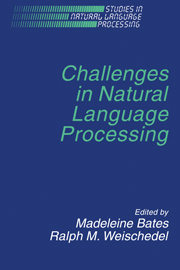Book contents
- Frontmatter
- Contents
- Preface
- Symposium participants
- Part I Challenging problems
- Part II Building a lexicon
- 2 The contribution of lexicography
- 3 The contribution of linguistics
- 4 The contribution of computational lexicography
- Part III Semantics and knowledge representation
- Part IV Discourse
- Part V Spoken language systems
- Part VI Conclusion
- Author index
- Subject index
2 - The contribution of lexicography
Published online by Cambridge University Press: 05 March 2010
- Frontmatter
- Contents
- Preface
- Symposium participants
- Part I Challenging problems
- Part II Building a lexicon
- 2 The contribution of lexicography
- 3 The contribution of linguistics
- 4 The contribution of computational lexicography
- Part III Semantics and knowledge representation
- Part IV Discourse
- Part V Spoken language systems
- Part VI Conclusion
- Author index
- Subject index
Summary
Introduction
One of the major resources in the task of building a large-scale lexicon for a natural-language system is the machine-readable dictionary. Serious flaws (for the user-computer) have already been documented in dictionaries being used as machine-readable dictionaries in natural language processing, including a lack of systematicity in the lexicographers' treatment of linguistic facts; recurrent omission of explicit statements of essential facts; and variations in lexicographical decisions which, together with ambiguities within entries, militate against successful mapping of one dictionary onto another and hence against optimal extraction of linguistic facts.
Large-scale electronic corpora now allow us to evaluate a dictionary entry realistically by comparing it with evidence of how the word is used in the real world. For various lexical items, an attempt is made to compare the view of word meaning that a corpus offers with the way in which this is presented in the definitions of five dictionaries at present available in machine-readable form and being used in natural language processing (NLP) research; corpus evidence is shown to support apparently incompatible semantic descriptions. Suggestions are offered for the construction of a lexical database entry to facilitate the mapping of such apparently incompatible dictionary entries and the consequent maximization of useful facts extracted from these.
How ‘reliable’ are dictionary definitions?
Writing a dictionary is a salutary and humbling experience. It makes you very aware of the extent of your ignorance in almost every field of human experience.
- Type
- Chapter
- Information
- Challenges in Natural Language Processing , pp. 37 - 75Publisher: Cambridge University PressPrint publication year: 1993
- 14
- Cited by



